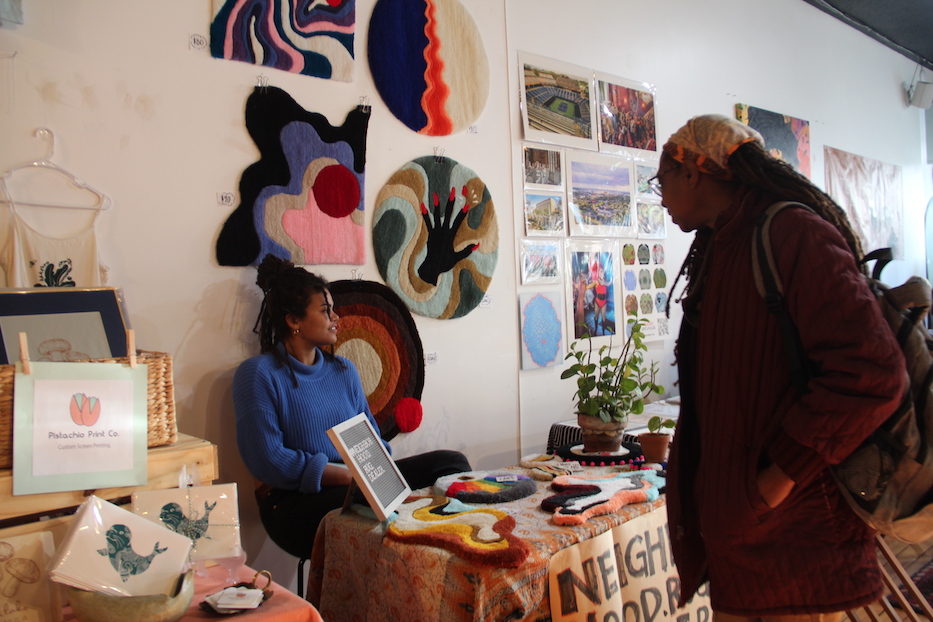
Culture & Community | Dexter Singleton | Lotta Studios | Arts & Culture | Visual Arts | Westville
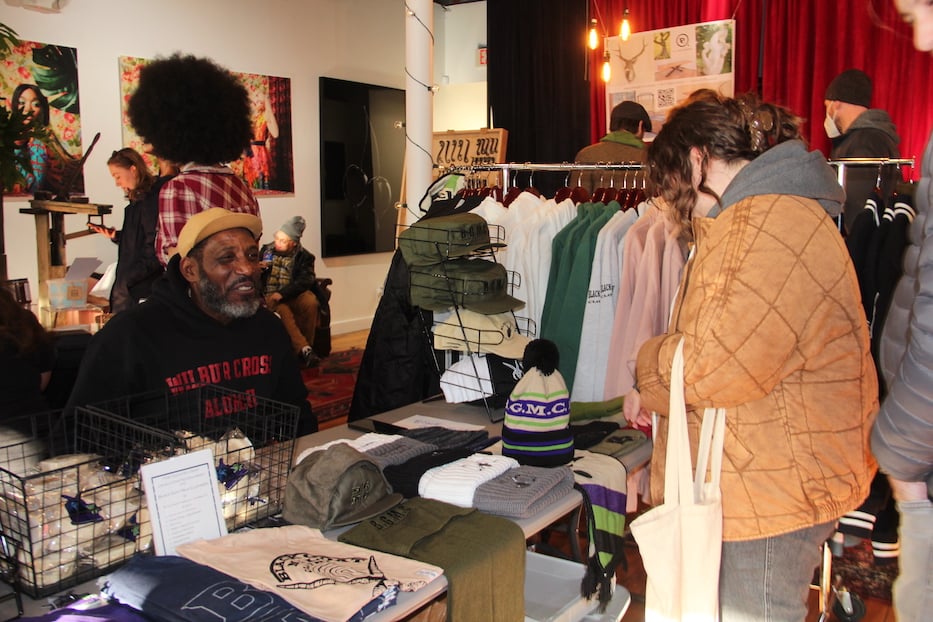
Anthony Murrell of Black Goat Milk Clothiers. Kayla Yup Photos.
Tucked in the middle aisle, Anthony Murrell—founder of the men’s apparel brand Black Goat Milk Clothiers—sat with an arm extended over a pile of beanies. He spoke into his phone’s front camera, addressing his brand’s Instagram audience over livestream. “We are here at Lotta Studio,” he began, followed by a rattled off list of items for sale around the room. There were rugs, mugs and soaps and body butters.
“You name it, we got it,” Murrell declared.
Murrell's message was right on time, as the seventh annual "Anti-Mall" at Lotta Studio put New Haven-based artists in dialogue with each other, prompting collaboration over competition. The 13 small businesses congregated in Lotta Studio’s storefront like a village, becoming neighbors in an effort to promote shopping locally. Upstairs, West River Arts beckoned with more artwork, as did Kehler Liddell Gallery down the block.
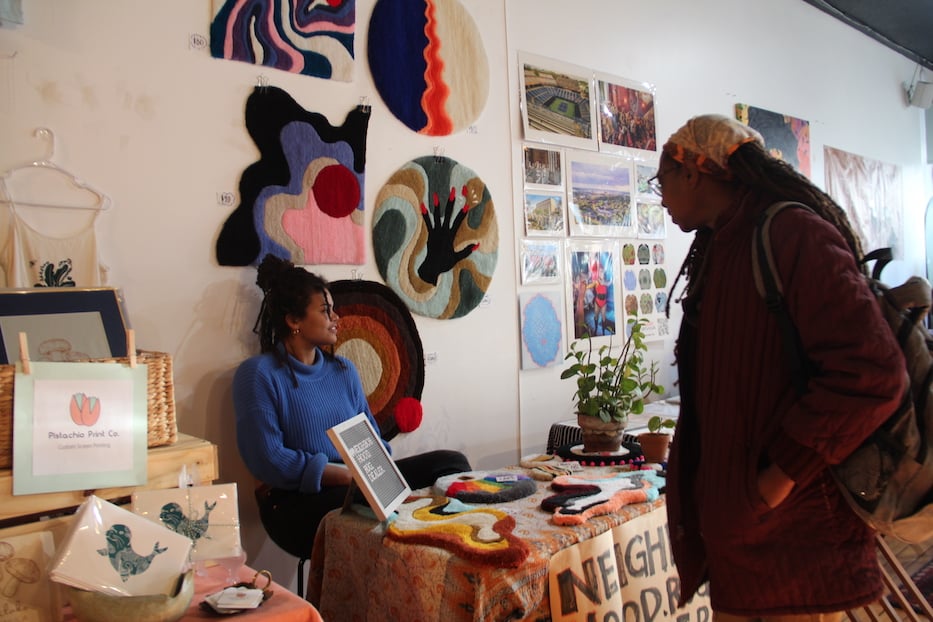
Zoe Jade Phillips of Neighborhood Rug Dealer. She was appearing with her work at the Anti-Mall for the first time.
Mistina Hanscom, co-founder and co-owner of Lotta Studio, said she started the anti-mall to inspire people to buy from local businesses instead of big retailers during the holiday season.
“When you're purchasing things through a store or online, there are many layers in between you and the person that's actually making that product,” Hanscom said. “The anti-mall [creates] a direct connection … [which] adds not only a sentimental value … but a relatability.”
Sporting a "Wilbur Cross Alumni" hoodie and a beige cap, Murrell hopped up from his booth to take his Instagram audience on a tour of the entire room. Starting at his own table for Black Goat Milk clothiers, he showed his array of beanies, t-shirts, hats and jackets. “But we got some other folks in the building,” Murrell added.
Murrell’s camera panned to the Huneebee Project’s booth, followed by Kiah Smith’s Smithmade Essentials display of soaps and candles. Huddles of people perused the shops and chatted up owners. Weaving through them, Murrell stopped at each pop-up, often greeted by a smile from the vendors. Careful to Zoom into QR codes and products, Murrell promoted the brands as if his own.
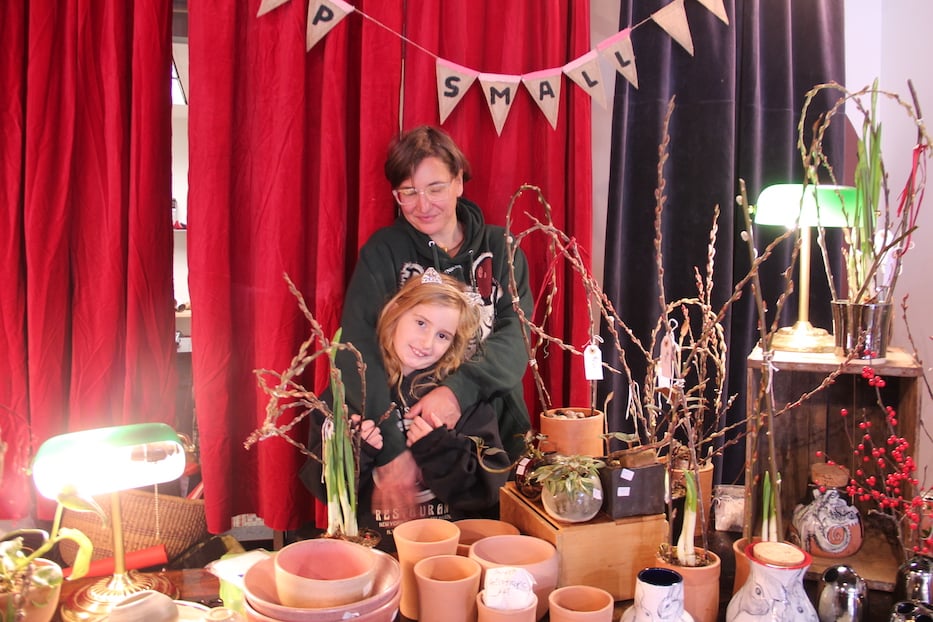
Alexis Brown of Heliotropic Art with her daughter (she is repping one of Mindless Thoughts' original designs).
“This is custom work here,” Murrell stated, zooming into metalwork at EJ Davis Aesthetics’ booth. “This fine gentleman here,” he continued: Erich Davis smiled at the camera as Murrell showcased Davis’ creations and promotional materials.
Neighboring Davis, Alexis Brown of Heliotropic Art displayed her painted ceramics. Murrell admired her bowls’ whimsical appeal, eyeing the fish illustrated on the inside.
“They’re just begging for some Top Ramen,” Murrell said, in reference to the bowls.
Over half of the businesses at the event have appeared annually since the anti-mall’s inception—Brown was one of three new artists. She was joined by her daughter, who greeted customers unabashedly. Brown entered the world of pottery as a professional gardener with a science illustration background.
She paints animals on her ceramics—from rabbits on vases to monkeys on cups—for her business Heliotropic Art. Brown admires the close-knit community fostered among ceramicists who, rather than being competitive, celebrate the individuality of each potter’s work.
“Your style is specific to you, so there are all of these personalities that come out and play,” Brown said. “A lot of ceramicists collect a lot of other people’s pottery because they can see the person in those pots.”
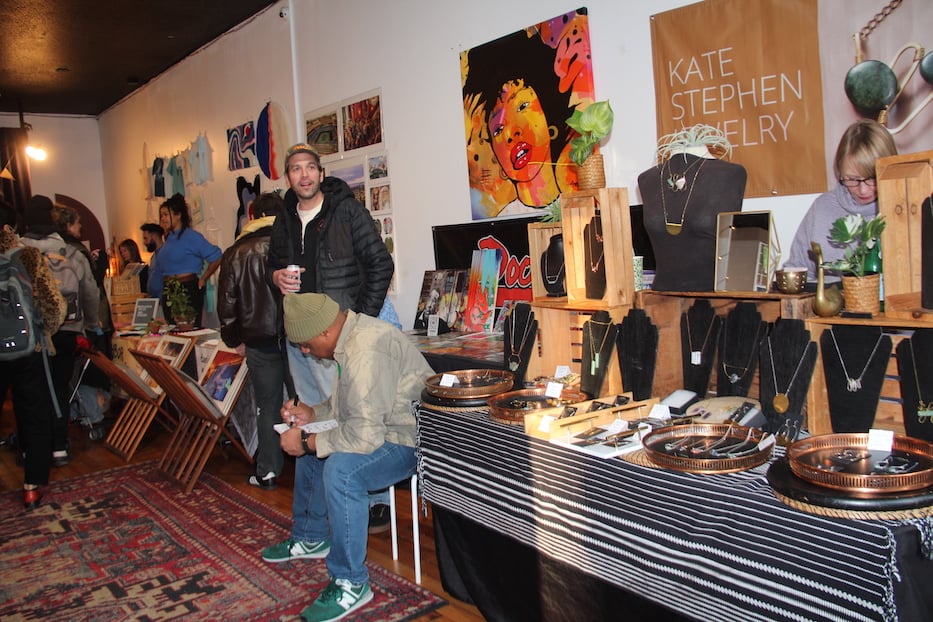
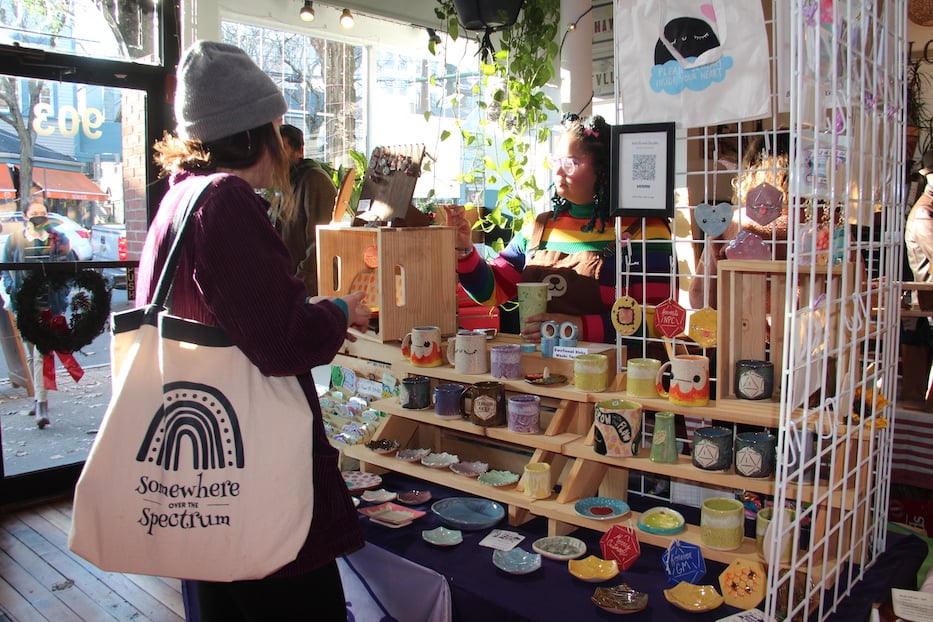 Ave Rivera (behind booth) of West Haven's Ave Rivera Studio.
Ave Rivera (behind booth) of West Haven's Ave Rivera Studio.
Ceramics is about capturing movement and energy, according to Brown. She gestured to Ave Rivera’s booth, which featured emotive mugs, cute illustrations, and keychains that either smiled or stuck their tongues out. To Brown, the intimacy between Rivera and her pottery gives her pieces “life.” “You can tell what she invests in each individual piece,” Brown said.
Brown’s daughter skipped over to Rivera’s business, called Ave Rivera Studio, to buy a keychain. From Dungeons and Dragons-themed work to products painted with her feelings and emotions, Rivera returned for her fifth year selling at the anti-mall. To Rivera, it’s important to show that artists exist and are part of the community: she believes in the power of a circular economy.
Through the event, people can spend money supporting local artists, and the artist will “more than likely,” keep that money within the community, Rivera said. They could put it back into art, she said, or spend it at a local restaurant or a bodega.
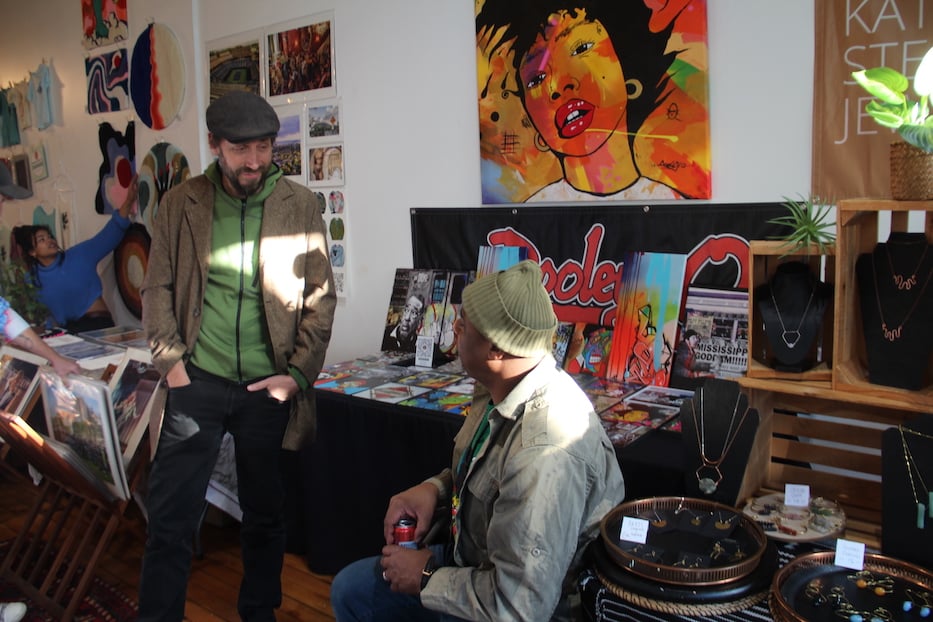
DJ Dooley O at the Anti-Mall. This year, he's been instrumental in keeping the Westville Arts Market going with artist Kate Stephen.
Jasmine Harris, a New Havener who visited the anti-mall for the first time, said she hates shopping at Amazon every Christmas. She found that shopping locally and at small businesses ensures a “more unique” present that people “appreciate more.” As she made the rounds, Harris bought tea called "Lionheart" from Florapothecerie. The notion of “brave and anxious” reminded her of her cousin, who likes to stay up reading with a cup of tea.
“It makes you feel more a part of the community, rather than [buying from] this big corporation that you don’t know anything about,” Harris said of the overall event. “It feels more like a real person.”
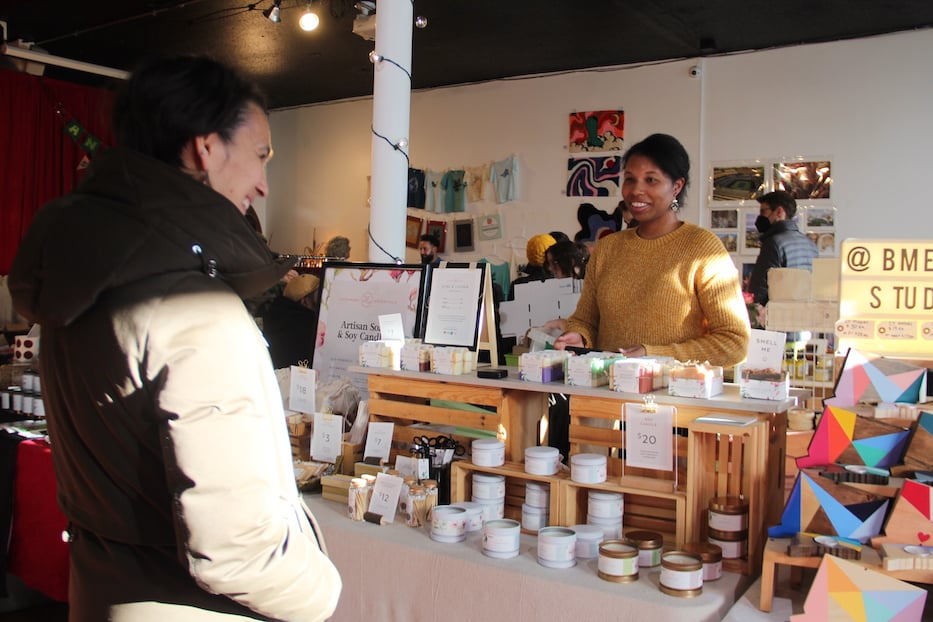
Artist Kiah Smith of Smithmade Essentials.
Sami Jo Jensen, the founder of Florapothecerie, is not shy about the origin of her 100 percent natural, vegan beauty brand. To avoid potentially toxic chemicals, she ditched her favorite bodywash and, using her herbalist knowledge, worked on safer skincare products.
The man she was dating at the start of her business called her a “dirty hippie” for making her own natural deodorant, which is now one of her bestselling products. In addition to avoiding toxic chemicals, she ditched her “toxic ex,” she joked. Jo Jenson said she wants to help other women ditch toxic chemicals, toxic people and toxic thoughts. At events like anti-mall, she enjoys talking to patrons about this origin story and about their own experiences.
“I tell my story, other people tell me their stories,” Jo Jenson said. “I basically hear everything because it’s skincare and it’s very personal.”
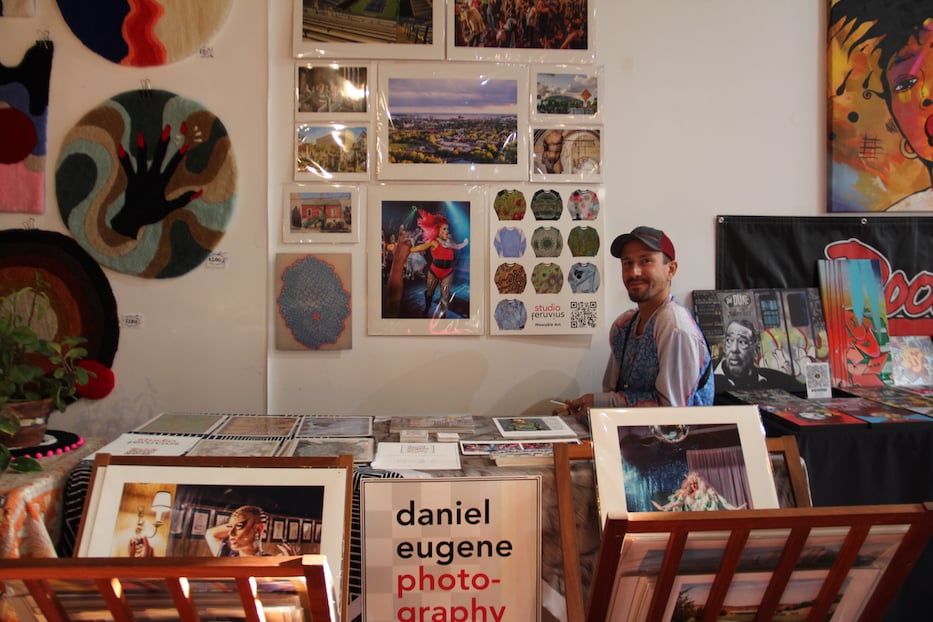
Daniel Eugene, whose alter ego is the drag queen Sorcia Warhol.
Daniel Eugene’s table stood across from Jo Jensen’s space, repping Studio Feruvius. Donned in "wearable art" that he designed himself, Eugene sat next to photographs of drag queens at Partners Cafe. From his experience performing drag as the queen Sorcia Warhol, he became interested in documenting the drag performance scene.
It has also inspired his series’ Drag Racing and Checkered Pride, which bring together two otherwise separate parts of his life. Inspired by his upbringing racing cars (read more about that here), Eugene enjoys photographing grassroots stockcar racing. As one of the only openly gay people in the racing community—such representation is “essentially nonexistent,” he said—he sees a visual parallel that others may miss, because they’re not in both worlds.
He outlined similarities between the drag and racing scenes: pride, rebellion, flamboyance and flag waving.
“I think one of the most important things art should do is make people uncomfortable,” Eugene said. “I love the idea of building a pillar in the middle and then building the bridge outward to both sides…I feel like I have a unique opportunity because of my experience as a drag queen race car driver.”
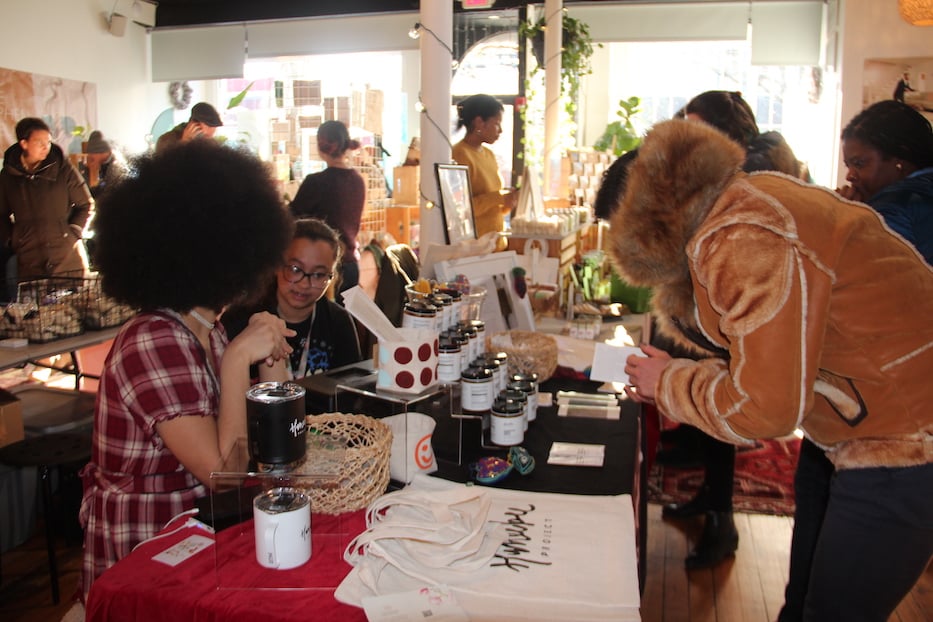
A table from the Huneebee Project was rarely without curious customers.
Eugene and Zoe Jade Phillips (pictured above), the Neighborhood Rug Dealer, were first-timers at the anti mall. Murrell, camera in hand, continued making his rounds to showcase the newcomers and anti mall veterans alike.
At Kate Stephen Jewelry’s table, Murrell shouted out the “lovely mother of Kate Stephen Jewelry,” who manned the booth beside artist Kate Stephen herself. Stephen has been running her jewelry design business for the past 11 years, and works in a studio upstairs from Lotta Studio. She called the anti-mall a “tradition” in Westville, where local artisans and community members gather to support the local economy through buying “unique handmade gifts.”
“As artists, a lot of us work solo,” Stephens said. “So to be able to come together and support one another in person is really important on a spiritual and mental health level.”
Murrell eventually finished highlighting every business at the anti-mall, settling back into his booth. He called these in-person selling events a “lesson in patience.” Some people who may have “just touched up and kept walking” by his products a year ago could return as customers this year.
To Murrell, events like Saturday’s represent people becoming more conscious about seeking locally sourced and manufactured goods, instead of supporting big corporations “monopolizing our dollars.” He compared shopping locally to eating at someone’s mother’s house instead of a chain restaurant—the love that goes into home-cooked food makes all the difference in taste.
Murrell called for a renewed desire among the public to patronize local businesses to “allow the little guy to compete.” Not win, he emphasized, but at least compete. This is a mission that unites all of the creatives at the anti-mall.
In his livestream, Murrell extended an invitation once more: “We’re out here. We’re not going to be small forever, but we are today. Check us out.”

